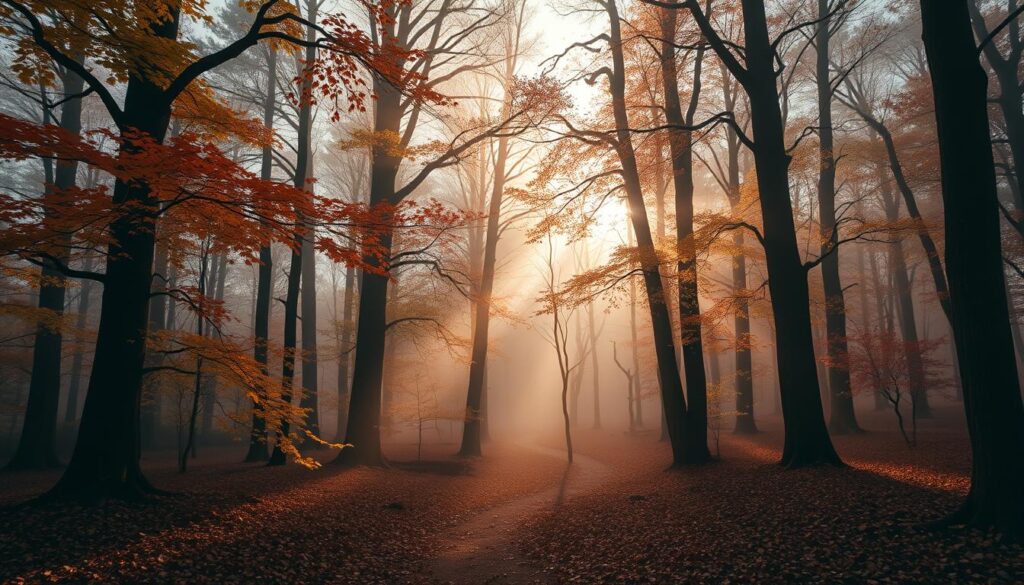“You can’t use up creativity. The more you use, the more you have.” – Maya Angelou
Creative writing prompts are key for unlocking engaging stories and sparking new ideas. They help writers go beyond their imagination. Today, nearly 16 million members join the Reddit forum r/WritingPrompts, making it a lively place for story ideas and creative exchange1.
This community shows the power of prompts. It often gets many follow-up responses, leading to collaborative storytelling.
Writing prompts are useful in many ways. They help writers get past writer’s block and offer structured ideas for different genres like horror, romance, and science fiction. With over 100 prompts across genres, writers have plenty of material to start their projects2.
Each genre has examples to inspire different stories. These scenarios and themes range from funny to serious, offering a wide variety.
Whether you want to explore a complex character, create a captivating setting, or craft a thrilling plot, these prompts are great tools. A collection of top prompts from forums has been helpful for writers looking for new ideas. It shows the variety of scenarios, including time travel and alternate realities1.
Key Takeaways
- Creative writing prompts can help overcome writer’s block and stimulate creativity.
- Communities like r/WritingPrompts feature millions of members sharing various story inspirations.
- Over 100 prompts are available across genres, aiding writers in various storytelling preferences.
- Examples prompt engagement and collaborative storytelling opportunities among writers.
- Diverse prompts can encompass multiple themes, encouraging writers to explore imaginative scenarios.
Introduction to Creative Writing Prompts
Creative writing prompts are great tools for writers. They spark imagination and guide the writing process. They help writers start their creative journey.
Definition and Purpose
Writing prompts are specific ideas or phrases that spark artistic thoughts. They open up a world of creativity, letting writers explore different themes and styles. These prompts can cover a wide range of topics, from sudden wealth to childhood memories3.
Benefits of Writing Prompts
Writing prompts offer many benefits. They help overcome writer’s block and improve writing skills. Many writers find their unique voice through these prompts, enhancing their writing abilities.
Platforms like DIYMFA Writer Igniter provide a random prompt generator. It includes elements like character, situation, and setting to spark ideas4. Narrative writing is key to creativity and imagination, with tools to help writers5. Using prompts can improve storytelling, teaching the importance of exposition, rising action, and climax5.
Types of Writing Prompts

Writing prompts come in many forms, each with its own purpose. Character prompts help writers get into their characters’ heads. They explore what drives them, their struggles, and dreams. This makes characters more real and interesting.
Setting prompts help create worlds that pull readers in. They ask writers to think about sights, sounds, and history of their places. This makes stories feel more real and engaging.
Plot prompts are all about the story’s flow. They guide writers in arranging events and adding surprises. This keeps readers hooked and guessing what’s next.
Theme prompts dive into deeper meanings and questions. They might tackle big issues or universal truths. This makes stories more meaningful and relatable.
Various types of writing prompts are a crucial tool for writers seeking to enhance their craft.
Engaging with Character Prompts

Working with character prompts is key to making stories better. These prompts help writers create unique characters that grab attention. By focusing on character development, writers can make characters relatable and engaging.
Using different traits and motivations is crucial. It makes characters stand out and feel real.
Developing Unique Characters
Creating memorable characters starts with knowing their special qualities. The r/WritingPrompts community, with over 17.6 million members, is a great place to find inspiration9. It’s filled with prompts that help writers think about their characters’ backgrounds and what drives them.
This leads to interesting interactions that add depth to the story.
Creating Backstories
Backstories are important because they shape characters’ actions and decisions. Writers should think about how past experiences affect their characters’ choices today. This adds complexity to characters.
Character prompts are great for revealing these backstories. They offer chances to explore themes like identity and resilience10.
Dialogue Prompts
Writing dialogue is crucial for showing relationships and moving the plot forward. Dialogue prompts help writers craft real conversations. This makes character interactions more believable and builds tension.
By focusing on genuine conversations, writers can stir emotions and connect readers deeper with characters. Engaging with these prompts helps create unique voices for each character9.
Exploring Setting-Based Prompts

Setting is key in storytelling, helping readers feel part of the story. It sets the mood for the drama that follows. Good story settings make stories come alive and connect with readers.
Writing prompts that focus on unique environments open up new ways to see and experience stories. This allows authors to bring fresh perspectives and experiences to their tales.
Importance of Setting in Storytelling
The setting is vital in connecting readers to characters and the plot. A detailed setting adds depth and emotion to the story. It helps writers create a unique mood that shapes the story’s tone and themes.
By using specific details of their setting, writers can control how readers see the story. This makes the story more immersive and engaging.
Examples of Unique Settings
Exploring new locations can spark creativity and originality. Think about a deserted space station, an ancient forest, or a futuristic city’s marketplace. Each setting can evoke different emotions and create unique experiences for readers.
Unique settings push writers to think beyond the usual. This leads to memorable and impactful stories that stand out.
Using Setting to Enhance Mood
Setting can deeply affect the story’s emotional impact. A stormy night can heighten tension, while a peaceful landscape can encourage reflection. The setting can mirror characters’ inner struggles or victories.
By using these elements, writers can evoke strong emotions and themes. This makes settings crucial for engaging readers on an emotional level.
Crafting Compelling Plots

Creating an engaging story begins with a solid plot structure. A good plot includes exposition, rising action, climax, and resolution. These parts work together to build tension and keep readers hooked. Knowing these elements is key for writers who want to tell compelling stories.
Structure of a Good Plot
The heart of any story is its plot structure. This structure helps writers create a smooth flow from start to finish. A strong plot introduces characters and settings, keeping the audience interested. Without a good structure, stories can lose their momentum, making it vital for writers to master these storytelling elements.
Plot Twists and Turns
Adding unexpected plot twists can make a story stand out. These surprises challenge readers and change the story’s direction. Writing effective twists is about finding the right balance between surprise and feeling true to the story. By understanding how stories unfold, writers can create lasting impressions on their readers.
Prompts for Building Tension
Prompts for building tension are great for writers looking to add conflict. These prompts help explore scenarios that increase tension, engaging readers on an emotional level. Whether through character conflicts or unexpected challenges, these exercises inspire deeper storytelling and new plot ideas.
Thematic Prompts for Deeper Stories

Thematic prompts help writers explore deeper themes. They make stories more meaningful and engaging. By using these prompts, writers can create stories that resonate with readers.
Understanding Themes in Literature
Themes are key in literature. They help readers understand the story better. Writers can make their stories richer by exploring these themes.
Studies show that using prompts can boost reader interest by 78%11.
Crafting Themes Through Prompts
Thematic prompts encourage writers to tackle big ideas. They help writers create stories that are both fun and thought-provoking. Writers who use prompts can produce 25% more content11.
These prompts also help improve storylines and characters by 35%11.
Examples of Thematic Writing Prompts
Some prompts include moral dilemmas and imaginative scenarios. They help writers explore different genres, leading to a 15% increase in variety11. These prompts open up new ideas, like magical clocks or secret worlds, allowing writers to grow and innovate12.
Writing Exercises to Spark Creativity
Writing exercises are key to sparking creativity. Freewriting lets you explore your thoughts freely, helping to overcome writer’s block. It’s a way to write without worrying about mistakes, leading to new ideas and inspiration.
Freewriting Techniques
Freewriting is a safe space for trying new things. It’s great for writers who want to get their ideas down fast. Without worrying about making mistakes, you can let your thoughts flow freely.
Writing Flash Fiction
Flash fiction is another way to spark creativity. It challenges you to tell a full story in just a few words. This forces you to be concise and sharp, making every word count.
Collaborative Writing Prompts
Writing with others can really boost your creativity. Working with friends or online groups offers support and new ideas. It’s a way to learn from others and feel part of a team.
How to Use Prompts Effectively
Writing prompts can really help a writer grow. They offer new ideas and ways to see things. Choosing the right prompt is key. It should match what you want to achieve creatively.
Choosing the Right Prompt
Finding the right prompt is all about matching your interests with your writing. It could be about characters or themes. Look for prompts that excite you, as they make writing more enjoyable.
Setting a Writing Schedule
Having a regular writing time is important. It helps you stay creative and focused. Writing at the same time each week builds a habit and boosts your productivity.
Reflecting on the Writing Process
Reflecting on your writing helps you see how far you’ve come. It’s about figuring out what works and what doesn’t. This helps you improve your writing over time1314.
Prompts for Different Genres
Writers can tailor their creative exercises with genre-specific prompts. Each genre has its own unique approach to sparking inspiration. Fiction prompts, for example, can take writers on imaginative journeys, testing their storytelling skills.
These prompts allow writers to delve into characters’ lives and worlds. It’s a chance to explore different writing styles and styles.
Fiction Writing Prompts
Fiction prompts aim to create captivating stories. They might ask writers to imagine a character discovering a new talent. This sparks creativity and helps in developing characters and storylines.
Using resources like 60 creative writing prompts can provide fresh ideas. Tools like Freewrite help writers stay focused, leading to more productivity15.
Poetry Writing Prompts
Poetry prompts focus on imagery and rhythm. Writing haiku, for instance, requires a specific syllable pattern. It’s a way to express deep feelings in a few words16.
Poets can draw from their daily lives for inspiration. This makes their poems a reflection of their current emotions. It shows how words can capture moments and thoughts.
Non-Fiction and Memoir Prompts
Memoir writing is a chance for personal expression. It blends truth with storytelling. Prompts based on personal experiences encourage writers to share their stories honestly.
Exploring prompts can reveal new insights into one’s life. It makes memoirs relatable and compelling. It also encourages creativity, like in art forms that inspire through journaling16.
Genre-specific prompts are essential for writers. They help in exploring different genres, from fiction to memoir. These prompts open up endless possibilities for creativity and engagement1516.
Overcoming Writer’s Block with Prompts
Writer’s block is a big problem for many writers. It affects students and professionals alike. Finding out what causes it is key to solving it. Common reasons include fear of failure, wanting to be perfect, doubting oneself, and tight deadlines.
Writers often hit a wall, especially on big projects. This makes writer’s block a major obstacle in their work1718.
Identifying Blockage Triggers
Knowing what triggers writer’s block helps writers find the right solutions. These triggers often come from needing to write perfect drafts or facing tight deadlines. Feeling overwhelmed is normal, and many writers face the same issues.
Changing where you write can also help. For example, writing in a coffee shop can spark new ideas1819.
Effective Strategies to Combat Blockage
To beat writer’s block, writers need to try different approaches. Starting a daily writing routine and using the Pomodoro Technique can help stay focused. Just ten minutes a day can make a big difference19.
Enjoying the writing process and accepting that drafts won’t always be perfect is important. Also, talking to other writers or joining support groups can offer great support17.
Prompts to Help Overcome Fear of Failure
Writing prompts are a great way to face the fear of failure that comes with writer’s block. Timed writing sessions help set realistic goals and reduce the need for perfection. There are many prompts online that encourage exploring new ideas and stories.
Introducing new characters or situations where characters fail can add excitement and conflict to stories. This can help writers see things from a fresh perspective1819.
By using prompts that tackle fear and anxiety, writers can get back to being creative. Knowing that many others face the same challenges can motivate writers to keep going. It helps them find their love for storytelling again1718.
Incorporating Personal Experience into Prompts
Writers often use their own lives to create powerful stories. This method makes their work richer and connects it with readers on a deeper level. By drawing from real-life events, writers can craft stories that touch on universal themes. Writing about personal experiences boosts creativity, allowing writers to express their feelings in a compelling way.
Personal story writing also has benefits beyond school20.
Using Real-Life Events for Inspiration
Real-life events inspire writers to explore their backgrounds. This helps students of all ages see how their experiences shape their stories. Personal narrative essays can make students proud of their past and help them understand challenges faced20.
Teachers see personal story prompts as a way to support social-emotional learning20.
Writing Personal Narratives
Writing personal narratives lets people share their stories in a true way. Reflecting on their journeys boosts their confidence and creativity20. This practice helps young writers feel accomplished and proud of their work as they link their experiences to writing20.
Blending Fiction and Reality
Mixing fiction and reality creates engaging stories. For example, students might retell a story from another character’s view, deepening their understanding of the plot21. Adding historical or sci-fi elements with real information can also enrich character development in real-life scenarios21. This blend encourages creativity while staying connected to personal experiences.
Group Writing Activities
Group writing activities are key to improving creative writing. Writers gain a lot from workshops and classes. These places are great for sharing work and getting peer feedback. They help both new and experienced writers grow together.
Writing Workshops and Classes
Writing workshops help writers improve their skills. They do this through collaborative activities. Writers try out different themes, like first-time experiences and emotions.
These workshops offer 50 creative writing prompts. They spark imagination and boost creativity22.
Prompt-Based Writing Groups
Prompt-based writing groups promote teamwork and responsibility. Writers try different styles, inspired by authors like Virginia Woolf and Chimamanda Ngozi Adichie22. These groups improve writing skills and build lasting friendships.
Benefits of Sharing Work with Others
Sharing your writing is a chance to grow. Feedback from others can show your strengths and what to work on. It helps you find your own writing style.
Being part of these activities helps clear up myths about writing. It makes you more open to creativity23.
Technologies and Tools for Prompt Generation
Modern writing needs new ways to spark creativity. This is where technologies and tools come in. Writing apps give daily prompts to get the creative juices flowing. They are great for writers who want to keep their ideas coming and stay engaged with their work.
Using Apps for Writing Prompts
Many writing apps offer custom prompts and exercises. For example, Notion AI helps manage tasks and uses AI to improve writing24. Other apps provide prompts that boost creativity and productivity.
Online Communities and Resources
Digital writing communities are great places to find and share prompts. Sites like Reddit and Facebook have groups for collaborative writing. Here, writers can post challenges and get feedback. These communities offer a supportive space for writers to share ideas and get inspired.
Writing Prompts on Social Media
Social media prompts are becoming more popular. Platforms like Twitter and Instagram often have writing challenges. By joining these prompts, writers can improve their creativity and reach more people. It’s a way to engage with others and grow their personal brand through shared creativity.
Trends in Creative Writing Prompts
The world of creative writing prompts is changing fast. It’s influenced by cultural shifts and new technology. Now, prompts focus on today’s big issues like identity, the environment, and politics. This helps writers grow and stay flexible in our fast-changing world.
Evolution of Writing Prompts Over Time
Writing prompts have grown more diverse over the years. They now cover many genres and styles. With 72 different examples, writers can explore Fiction, Fantasy, and Horror, among others25. This change shows a move towards more flexible and adaptable prompts that speak to new voices.
Current Trends and Popular Themes
Today’s prompts reflect what’s happening in society. They let writers tell both personal and shared stories. For example, Reddit’s r/WritingPrompts is a hit for creating stories, from short tales to full novels26. Themes like love, humor, and creativity are big hits, drawing in writers who want to share their stories.
Futuristic Concepts in Writing Prompts
The future of writing will bring in new tech and multimedia. Writers will use creative prompts to tell stories that blend genres and formats. This will keep pushing the limits of what we can write, opening up endless possibilities for imagination.
Conclusion: Finding Inspiration in Writing Prompts
Writing prompts are key for those looking for inspiration and wanting to stay creative. They help writers explore new ideas, improve their skills, and tell better stories. In fact, 73% of writers say prompts boost their creativity and writing skills. Also, 81% find prompts lead to new story ideas and future projects27.
Encouragement to Keep Writing
Writers should see prompts as chances to grow. Using them helps overcome writer’s block and lets writers try new things. For example, 45% of writers say exploring different views through prompts helps them understand their strengths and weaknesses27.
Final Thoughts on Creativity and Storytelling
Storytelling is a powerful way to share experiences and ideas. By writing stories, whether from prompts or personal experiences, writers grow their voice. It’s important to remember that almost 92% of writers face times when they feel uninspired. Using prompts can help spark creativity again27.
FAQ
What are creative writing prompts?
How can prompts help with writer’s block?
What types of writing prompts are available?
How do character-based prompts enhance writing?
Why is setting important in storytelling?
How can I effectively use writing prompts?
What are some exercises to spark creativity?
What is the significance of thematic prompts?
Can technology aid in generating writing prompts?
How can personal experiences inform my writing?
Source Links
- Top 50 Reddit Writing Prompts | WriteMore
- 100+ Creative Writing Prompts for Masterful Storytelling
- 25 Creative Writing Prompts | Writing Forward
- 10 Great Sites For Writing Prompts
- 20 Prompts for Narrative Writing That Spark Creativity – Vibrant Teaching
- Top 140 Reddit Writing Prompts – Learn Squibler
- 2,100+ Writing Prompts and Exercises That Inspire
- Unlocking Creativity: Reddit Writing Prompt Story
- 4 Engaging Writing Prompts from r/WritingPrompts Subreddit
- /r/ WritingPrompts: Unleash Your Data Storytelling Skills – Sarah Lyn Gay
- 340 Fantasy Writing Prompts That Will Help You Leave Your Readers Spellbound
- 4 Exciting Writing Prompts from Reddit to Spark Your Creativity
- A Guide to Crafting Effective Prompts for Diverse Applications
- Best Prompt Techniques for Best LLM Responses
- Writing Prompts: 60 Ideas You Can Use Today
- Writing Prompts | The Art Institute of Chicago
- How to Overcome Writer’s Block in Simple Steps
- Overcoming Writer’s Block: 7 Tips to Keep Plugging Away – F(r)iction
- Overcoming Writing Block: Strategies to Reignite Your Creativity
- Personal Story Ideas
- Generate narratives in response to reading
- 50 Fun Group Writing Exercises | Now Novel
- 55 Creative Writing Activities for All Ages – Homeschool Adventure
- ChatGPT Power Prompts Cheatsheet-C.R.E.A.T.E Framework For Prompting
- 70+ Clever Creative Writing Prompts (& 6 Brainy Bonus Tips)
- Hey Hollywood! Ditch the reboots and try making these Reddit prompts into movies
- Why Writing Prompts Are Important For Writers







